A new two-legged eurozone
Adelina Marini, March 28, 2011
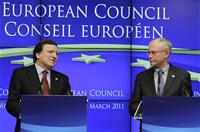 "The Economic and Monetary Union will finally walk on its two legs, instead of limping along", with these words European Commission President Jose Manuel Barroso explained the breakthrough, in his words, achieved late on March 24th at the European Council in Brussels on the reform of the eurozone. The leaders of the 27 had approved a final version of the Pact for the Euro Plus, as is the new name of the Pact for the Euro, and also the details of the new European Stability Mechanism (ESM) or the permanent eurozone rescue fund, which will start operations from July 2013.
"The Economic and Monetary Union will finally walk on its two legs, instead of limping along", with these words European Commission President Jose Manuel Barroso explained the breakthrough, in his words, achieved late on March 24th at the European Council in Brussels on the reform of the eurozone. The leaders of the 27 had approved a final version of the Pact for the Euro Plus, as is the new name of the Pact for the Euro, and also the details of the new European Stability Mechanism (ESM) or the permanent eurozone rescue fund, which will start operations from July 2013.
A eurozone Frankenstein?
After almost a year of attempts to reform the Stability and Growth Pact, and the euro area in particular, in order to avoid the domino effect under strong market pressure, the European Union invented something like a new structure, established over the old one. The construction of the new-old structure started gradually. First the new mechanisms for regulation and supervision have been created on the financial 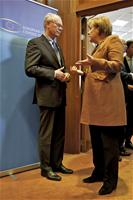 system. Then the European semester has been introduced, whose main function is to watch closely in germ the development of member states' budgetary policies, as well as their economic policies. And finally, starting from the ideas of creating a European Monetary Fund, the temporary rescue fund has been urgently created in order to stop the bleeding of the peripheral economies and, as of 2013, on its place, but not quite, the new permanent European Stability Mechanism will emerge.
system. Then the European semester has been introduced, whose main function is to watch closely in germ the development of member states' budgetary policies, as well as their economic policies. And finally, starting from the ideas of creating a European Monetary Fund, the temporary rescue fund has been urgently created in order to stop the bleeding of the peripheral economies and, as of 2013, on its place, but not quite, the new permanent European Stability Mechanism will emerge.
And on top of all this will be the hat, called Pact for the Euro +, which is in fact a package of guidelines which euro area member states will have to follow, together with non-euro area countries who join, with the only goal to ensure come comprehensiveness of economic efforts and to avoid a country to undertake a competitive dumping, like reducing retirement age in order to tackle social discontent by instead increasing indebtedness. Or to increase wages without supporting that with relevant competitiveness and juxtaposable productivity.
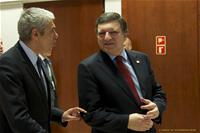 European Commission President Jose Manuel Barroso did not hide his satisfaction, in spite of the late hour of the news press conference he had with European Council President Herman Van Rompuy (after midnight CET). "In the past 12 months we have made great strides towards stronger economic governance. [...] So, in fact, we are now doing what was a very important aim for all those who wanted a stronger Europe to complete the monetary union with a real economic union". According to Mr Barroso, this achievement was possible thanks to the realisation how interconnected the European economies are.
European Commission President Jose Manuel Barroso did not hide his satisfaction, in spite of the late hour of the news press conference he had with European Council President Herman Van Rompuy (after midnight CET). "In the past 12 months we have made great strides towards stronger economic governance. [...] So, in fact, we are now doing what was a very important aim for all those who wanted a stronger Europe to complete the monetary union with a real economic union". According to Mr Barroso, this achievement was possible thanks to the realisation how interconnected the European economies are.
The Commission chief added that with almost complete the process of reforms the European Union is delivering on its outside world commitments, the G20 in particular. He recalled that at the G20 summit in Toronto the EU promised fiscal coordination, financial instruments, financial repair and governance "and Europe may say that Europe has delivered its part of the bargain on the global governance".
Herman Van Rompuy, the European Council president, on his part announced 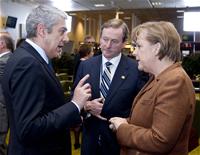 that six countries had decided to join the Pact for the Euro +: Denmark, Poland, Latvia, Lithuania, Bulgaria and Romania. Only several hours before the Council, Bulgarian PM Boyko Borissov surprised the Members of Parliament in the National Assembly, and the entire society at large, by announcing that Bulgaria was joining the Pact for the Euro. In a message of the government information service the following is stated:
that six countries had decided to join the Pact for the Euro +: Denmark, Poland, Latvia, Lithuania, Bulgaria and Romania. Only several hours before the Council, Bulgarian PM Boyko Borissov surprised the Members of Parliament in the National Assembly, and the entire society at large, by announcing that Bulgaria was joining the Pact for the Euro. In a message of the government information service the following is stated:
"The Bulgarian support is in principle, as of a country whose accession to the euro is forthcoming. Our country has already achieved part of the measures in the pact and is among the countries with lowest debt in the EU. In spite of the economic and financial crisis Bulgaria has the lowest taxes in the EU. During the talks at the summit of the European Union, will be expressed the Bulgarian position in defence of national interests, by in the same time keeping the so far achieved competitive advantages".
From the message of the Council of Ministers it does not become clearer which measures in the pact precisely has Bulgaria achieved. By the time of writing of the Bulgarian version of this article, the European Council conclusions were not available yet, so details on the specific parameters of the agreement will be available in English on euinside soon.
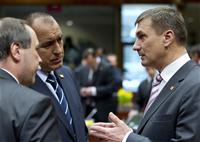 At the late night news conference, however, Herman Van Rompuy read some of the specifics in the final agreement for the creation of the permanent rescue fund. What has been agreed slightly differs from the initial agreement of the financial ministers a few days before the summit, the European Council President explained. 500bn euro will be available for lending with a triple A credit rating, and the temporary fund will have an effective lending capacity of 440bn euro. This amount will be available as of June. "The ESM will have a total subscribed capital of 700bn. On this amount 80bn will be in the form of paid in capital provided by the euro area member states being phased in from July 2013 in five equal annual installments", Herman Van Rompuy read from the conclusions. The rest 620bn euro, as euinside wrote, will be in the form of guarantees of the member states.
At the late night news conference, however, Herman Van Rompuy read some of the specifics in the final agreement for the creation of the permanent rescue fund. What has been agreed slightly differs from the initial agreement of the financial ministers a few days before the summit, the European Council President explained. 500bn euro will be available for lending with a triple A credit rating, and the temporary fund will have an effective lending capacity of 440bn euro. This amount will be available as of June. "The ESM will have a total subscribed capital of 700bn. On this amount 80bn will be in the form of paid in capital provided by the euro area member states being phased in from July 2013 in five equal annual installments", Herman Van Rompuy read from the conclusions. The rest 620bn euro, as euinside wrote, will be in the form of guarantees of the member states.
European media commented that the agreement of Thursday night was a result of Germany's pressure the capital of the permanent fund not to be paid at once, as this was heavily criticised by German opposition.
Ireland was off the agenda
Although it was in the programme for discussion by European Union leaders, the issue of renegotiation of the interest rate on Ireland's loan was off the agenda of the summit. Responding to a journalist's question Herman Van Rompuy explained that in a week the results of Irish banks stress tests were expected, which were important in order to assess the consequences of the government's programme. When the results are ready, the decision could be taken by EU finance ministers, the President of the European Council added.
At the special eurozone Council on March 11, Greece managed to renegotiate better conditions on its bail-out from the EU and the IMF, but as Ireland is firmly refusing to comply with the requirement to increase the basis of its corporate tax, the new prime minister, Enda Kenny, was given a deadline by the March 24 and 25 European Council to respond. Obviously Mr Kenny had won a little bit more time.
Portugal is not a problem
Another interesting news from the Spring European Council is that Portugal will continue to implements its fiscal commitments, no matter what the next government of the country will be. As you know, on the eve of the Council the prime minister socialist, Jose Socrates, resigned after the Parliament rejected the fourth consecutive 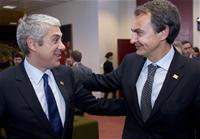 austerity package. In the words of Jose Manuel Barroso (former right Portuguese prime minister of Portugal), Jose Socrates had assured his colleagues that no matter what the composition of the future government in Lisbon would be, it will stick to the commitments.
austerity package. In the words of Jose Manuel Barroso (former right Portuguese prime minister of Portugal), Jose Socrates had assured his colleagues that no matter what the composition of the future government in Lisbon would be, it will stick to the commitments.
Portugal's case is very interesting because obviously there is a consensus among all the big political parties represented in Parliament on the fiscal goals for the next two years. There are differences regarding specific measures. And in spite of the strong support on behalf of the euro area and the European institutions, the reform packages cannot pass in Parliament. This again raised the question why then holding early elections, as euinside also asked before the Council.
 | © European Parliament
| © European Parliament | © The Council of the European Union
| © The Council of the European Union | © European Parliament
| © European Parliament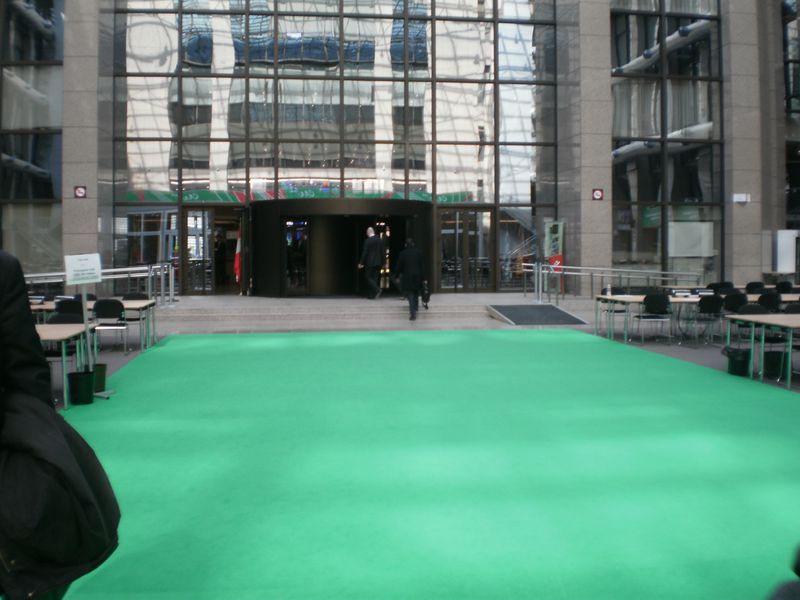 | © Ralitsa Kovacheva | www.euinside.eu
| © Ralitsa Kovacheva | www.euinside.eu